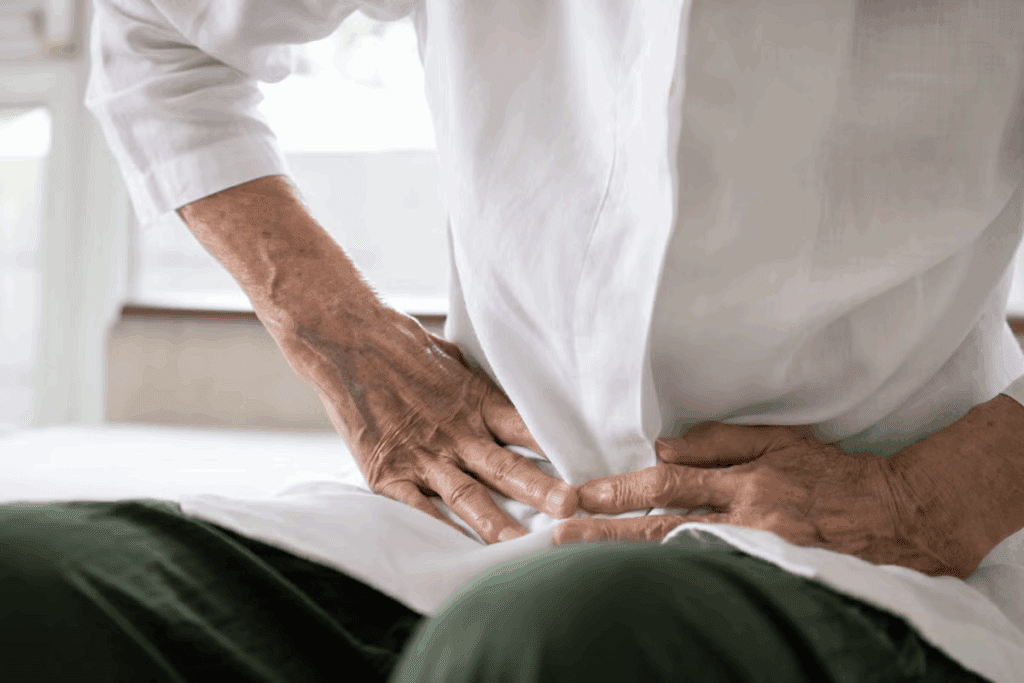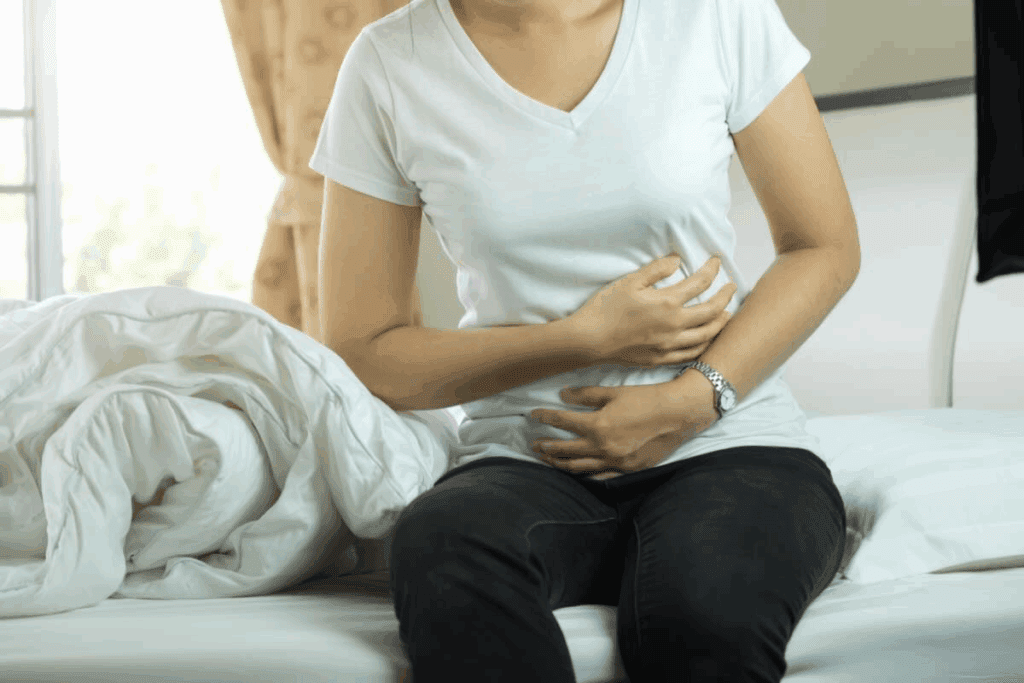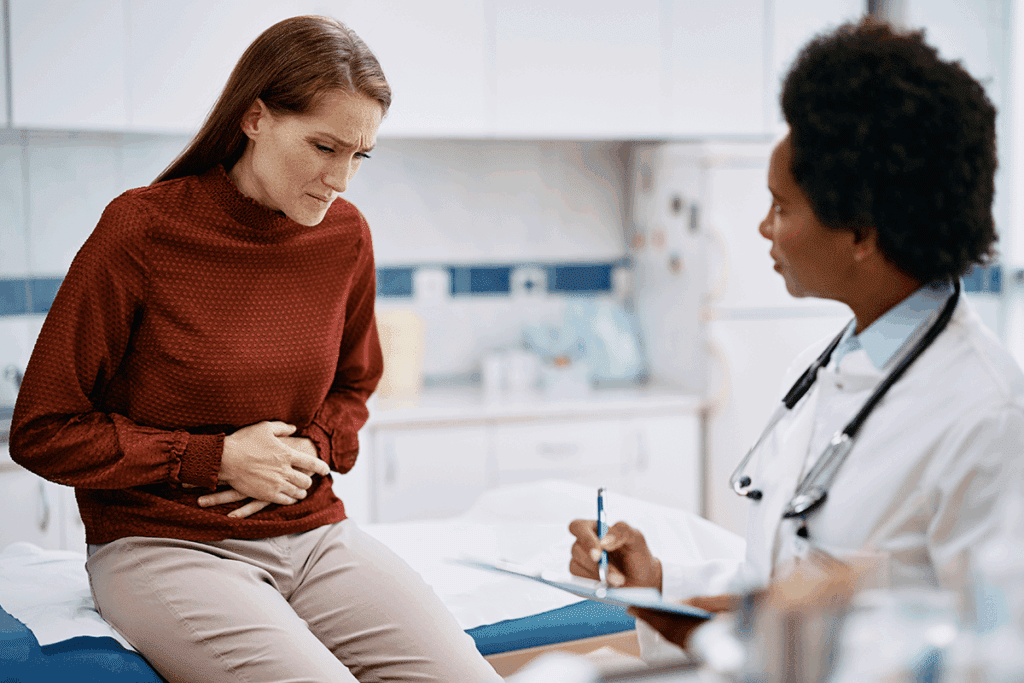Last Updated on November 26, 2025 by Bilal Hasdemir

Having a colon resection can greatly affect daily life, especially when it comes to bowel movements. Surgery for colorectal cancer often leads to new patterns and habits in the bathroom.
Many patients experience frequent bowel movements after colon resection, along with urgency or difficulty fully emptying the bowel. These changes are common as the digestive system adjusts after surgery. Understanding why frequent bowel movements after colon resection happen and learning how to manage them can help patients feel more comfortable and in control.
At Liv Hospital, patients receive expert, personalized care through every stage of recovery. The medical team designs treatment and support plans tailored to each person’s needs, helping them manage bowel changes and regain quality of life after surgery.

Colon resection, or bowel resection, is a surgery that removes a part of the colon. This surgery is important and can change a patient’s life a lot. It’s done to remove the sick part and make the patient healthy again.
There are many types of colon resection surgeries. Each one is chosen based on what the patient needs. These include:
The type of surgery depends on where and how bad the problem is.
Colon resections are done for many reasons. These include:
Each case is carefully checked to see if surgery is the best option.
Recovering from colon resection surgery takes time. First, patients are watched in the hospital for any problems. Then, they manage pain, prevent infections, and start eating again slowly. They might have to change their diet because of changes in bowel movements.
As they get better, patients learn about diet changes and lifestyle adjustments. It’s important to follow the doctor’s advice for a smooth recovery.

Understanding frequent bowel movements after colon resection involves looking at the body’s changes after surgery. The colon’s removal affects how the digestive system works.
The colon helps absorb water and salts from waste. This makes stool solid. When part of the colon is gone, the rest must work harder to do this job.
Colon resection changes how long food stays in the digestive system. This can make bowel movements more frequent.
A study in the Journal of Surgical Research showed this. It found that colon resection shortens the time food stays in the colon. This leads to more bowel movements.
The colon absorbs water from waste. Removing part of it means less water is absorbed. This makes stools looser and bowel movements more frequent.
“The removal of a significant portion of the colon can lead to a condition known as short bowel syndrome, where the remaining intestine is unable to absorb sufficient water and nutrients, resulting in diarrhea and frequent bowel movements.”
| Physiological Change | Effect on Bowel Movements |
| Reduced Colonic Transit Time | Increased Frequency |
| Reduced Water Absorption | Looser Stools |
| Adaptation of Remaining Tissue | Gradual Improvement Over Time |
Over time, the remaining intestine adjusts. This can improve bowel habits, but it varies for everyone.
The body tries to make up for the lost colon by changing how it works. But, patients need to work with their doctors to manage symptoms and adjust to their new life.
Knowing what to expect with bowel changes after colon surgery can ease recovery. After surgery, bowel habits often change.
Patients often need to go more often and feel urgent. This can be hard to manage.
Keeping a food diary can help find foods that make symptoms worse.
Stool consistency can change too. Some might have diarrhea, while others might have constipation.
Stool consistency varies by person. It depends on diet, hydration, and surgery extent.
Some patients see bowel movements cluster. This means several in a short time, then a calm period.
Clustering can be unpredictable and uncomfortable. Knowing it’s part of recovery can help.
| Symptom | Description | Management Tips |
| Increased Frequency | More frequent bowel movements | Maintain a food diary to identify trigger foods |
| Urgency | Sudden need to have a bowel movement | Practice relaxation techniques, such as deep breathing |
| Changes in Stool Consistency | Diarrhea or constipation | Adjust diet, stay hydrated, consider fiber supplements |
| Clustering | Multiple bowel movements in a short period | Understand it’s a normal recovery process, plan according |
After colon resection surgery, patients see many changes in their bowel habits. Knowing when these changes happen can help ease worries and set realistic goals.
It’s normal for patients to not have a bowel movement for a week after surgery. This is because the body is stressed from the surgery and anesthesia affects the bowels.
In the first few months, patients might see:
These changes are part of the body adjusting. Eating the right foods, like a bowel resection diet, can help manage these symptoms.
After three months, the body keeps adapting. Some people’s bowel habits get closer to normal, while others stay different.
By one year after colon resection, most people find a new normal for their bowel habits. Some might see occasional changes, but many find their habits stabilize.
It’s important to remember that everyone’s experience is different. Things like how much of the colon was removed, overall health, and diet play a big role in recovery.
It’s possible that bowel habits won’t go back to what they were before surgery. But, with time, most people find a new ‘normal.’ Eating well and drinking plenty of water are key for good bowel health after surgery.
Recovering from bowel resection surgery can be tough, mainly because of managing gas and bloating. The body takes time to adjust to the surgery changes. This leads to more gas, causing discomfort and sometimes pain.
After surgery, the colon works faster, making more gas. This is because the colon is shorter. It leads to excessive gas after colon resection, which is uncomfortable and sometimes painful. “The changed body parts after surgery make gas more,” says Dr. Jane Smith, a gastroenterologist.
“The altered anatomy and physiology post-surgery contribute to the fermentation process, resulting in gas.” – Dr. Jane Smith, Gastroenterologist
Knowing why this happens helps in managing symptoms better.
There are ways to lessen gas discomfort. Start by avoiding foods that make gas, like beans and cabbage. Also, eat foods that are easier to digest. Eating smaller meals more often helps the digestive system.
Drinking plenty of water also helps with digestion and prevents constipation. Constipation can make bloating worse.
Passing flatus after surgery is part of getting better. But, how often and how much can worry patients. It’s key to know the difference between normal gas and signs of trouble. Severe pain, vomiting, or fever mean you need to see a doctor.
In summary, dealing with gas after bowel resection needs understanding the reasons, making the right food choices, and knowing when symptoms are normal or not.
Many patients worry about diarrhea after colon resection surgery. It can be a big problem, making life harder during recovery.
Diarrhea after surgery can happen in different ways. Some people have diarrhea all the time, while others have it less often. Knowing how it works helps manage it better.
Chemotherapy, sometimes used with surgery, can also cause diarrhea. This is because it can irritate the lining of the bowel.
Key factors influencing post-resection diarrhea include:
Controlling diarrhea often means making lifestyle changes and using medicine. Antidiarrheal drugs can help slow down bowel movements and reduce diarrhea.
“The use of antidiarrheal medications, such as loperamide, can help slow down bowel movements and reduce the frequency of diarrhea.”
But, always talk to a doctor before starting any new medicine. This ensures it’s safe for you.
Keeping hydrated and balanced electrolytes is key when dealing with diarrhea after surgery. Diarrhea can cause a lot of fluid and electrolyte loss.
To stay hydrated, patients are advised to:
By focusing on staying hydrated, keeping electrolytes balanced, and managing symptoms, patients can handle diarrhea after colon resection better.
After colon resection surgery, many people face changes in their bowel movements. Some might go to the bathroom more often, while others might find it hard to go. In some cases, there might be no bowel movement for up to a week.
Constipation after surgery can happen for several reasons. The type of surgery, how much of the colon was removed, and how each person recovers can play a role. Reduced physical activity and changes in diet also contribute.
Pain medications can slow down bowel movements, leading to constipation. The body’s response to surgery can also temporarily change bowel habits.
While some constipation after surgery is normal, sometimes it needs medical help. If constipation lasts long or is very painful, you should see a doctor. Symptoms like bloody stools or vomiting are serious and need immediate attention.
Health guidelines suggest seeing a doctor if constipation lasts more than a few days. Your healthcare provider can help find safe ways to manage it.
| Management Strategies | Description |
| Stool Softeners | Medications that help soften stool, making it easier to pass. |
| Laxatives | Substances that either stimulate the bowel to move or help retain water in the stool. |
| Dietary Changes | Increasing fiber intake, drinking plenty of water, and eating foods that can help stimulate bowel movements. |
Managing constipation well is key to a smooth recovery after colon resection surgery. Understanding the causes and knowing when to seek medical help can help patients through this tough time.
After colon resection surgery, a good diet is key to healing well. You might need to change your diet to manage bowel changes. This helps you recover smoothly and avoids complications.
Right after surgery, your diet should be easy on your stomach. You’ll start with clear liquids and then move to solid foods as you get better.
Your doctor will tell you when to add new foods to your diet.
As you get better, your diet will change to support your long-term health. You might need to:
Some foods can help with bowel changes, while others might make symptoms worse. It’s good to:
Embrace:
Avoid:
Eating smaller meals more often can help manage symptoms. It’s also important to:
Here’s a meal plan to try:
| Meal | Foods | Portion Size |
| Breakfast | Oatmeal with banana | 1 cup cooked oatmeal, 1 medium banana |
| Lunch | Grilled chicken, mashed potatoes | 3 oz chicken, 1 cup mashed potatoes |
| Dinner | Baked salmon, cooked vegetables | 3 oz salmon, 1 cup mixed vegetables |
Recovering from colon resection surgery means eating in stages. As you heal, changing your diet helps avoid problems and speeds up recovery. This guide helps you move from clear liquids to solid foods, making the post-surgery eating easier.
Right after surgery, start with clear liquids. This step is key for rehydrating and checking for any issues. You can have water, clear broths, and drinks like sports drinks. When you can handle these, move to a low-residue diet.
Low-residue foods are easy to digest and don’t leave much in your colon. They include:
As you get better, add soft, low-fiber foods to your diet. This step increases calories and nutrients without stressing your stomach. Good choices are cooked pasta, rice, and lean proteins like chicken or fish.
Eat small meals often to manage bloating and discomfort. Remember to:
Once you get used to soft foods, slowly add more fiber. Include more fruits, veggies, and whole grains. But do it slowly to avoid discomfort.
Long-term, eat a balanced diet full of nutrients. Some might need to change their diet forever, while others might recover fully. It’s important to watch what foods cause discomfort.
Keeping a food diary can help find out which foods to avoid.
| Food Type | Recommended | To Avoid |
| Fruits | Bananas, Avocados | Berries, Citrus Fruits |
| Vegetables | Cooked Carrots, Green Beans | Broccoli, Cauliflower |
| Grains | White Rice, Oatmeal | Whole Wheat Bread, High-Fiber Cereals |
Following this eating plan after colon resection surgery helps manage recovery and lowers complication risks. Always talk to a healthcare provider or dietitian for specific advice.
Knowing when to see a doctor is key for a smooth recovery after colon surgery. Some changes in bowel movements are normal. But, others might mean you need to see a doctor right away.
After colon surgery, watch your body closely for signs of trouble. Look out for:
If you see any of these signs, call your doctor fast.
Changes in stool color can worry you, even more after surgery. Black poop after surgery might seem scary, but it’s not always a problem. But, it’s good to know why it happens:
Black stool can come from some medicines or supplements, like iron. Or, it might mean bleeding in the upper stomach. If you see black stools or other weird colors, talk to your doctor to find out why.
Recovering from colon surgery means your body will change a lot. Some changes are okay, but others might mean trouble. It’s important to tell the difference so you can get help when you need it.
Normal recovery symptoms include some bowel changes, mild pain, and tiredness. But, if you have severe pain, keep getting fever, or have a lot of bleeding, it’s not normal. You should tell your doctor about these symptoms.
Getting follow-up care is a big part of recovering from colon surgery. Your doctor will tell you when to come back for check-ups. They’ll watch how you’re healing and answer any questions you have.
At these visits, your doctor will check on your recovery, look for any complications, and give advice on managing symptoms. It’s important to follow their advice to get the best results.
If you’re worried about your recovery or have questions, don’t hesitate to call your doctor. They can give you personalized help and support to make your recovery easier.
After colon resection surgery, bowel habits often change. These changes are a normal part of healing. You might not have the same bowel habits as before, but you can find a new ‘normal’ over time.
Bowel resection can make bowel movements softer and more frequent. Some foods and drinks can make this happen. Making dietary changes and improving bowel habits can help manage these changes. For more information, check out this resource.
Adjusting to your new normal after bowel resection takes patience. Making smart food choices and understanding your bowel habits can improve your life. Always talk to your healthcare provider if you have any unusual symptoms or concerns during recovery.
After surgery, you might find yourself going to the bathroom more often. Your stool might change too, becoming softer or harder. These changes usually get better over time as your body adjusts.
Recovery times vary, but most see big improvements in 1-3 months. Some changes might stick around longer, taking up to a year or more to fully adjust.
Surgery can change how your gut works, leading to more gas. This can cause bloating and discomfort. It’s a common side effect.
To manage diarrhea, try medication, change your diet, and drink lots of water. A low-fiber diet can help reduce how often you go.
Start with clear liquids and soft foods, then slowly add more fiber. Avoid foods that upset your stomach. This approach helps your body adjust.
Eat well, stay hydrated, and exercise regularly. Fiber supplements or stool softeners can also help if needed.
See your doctor if you have severe pain, vomiting, or bloody stools. Also, if you’re worried about your bowel function or recovery.
Look out for severe pain, vomiting, bloody stools, fever, and dehydration. If you see these signs, get medical help right away.
Black poop can be normal, like if you’re taking iron or eating certain foods. But it could also mean bleeding in your upper gut. Talk to your doctor if you’re unsure.
Bowel movements can vary, but most people have one within a few days to a week. If you’re concerned, check with your doctor.
Eat smaller meals, avoid foods that upset your stomach, and slowly add more fiber. A healthcare provider or dietitian can help tailor a plan for you.
Subscribe to our e-newsletter to stay informed about the latest innovations in the world of health and exclusive offers!